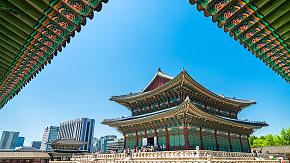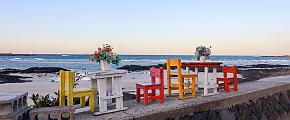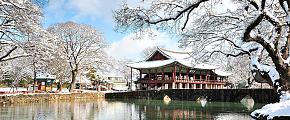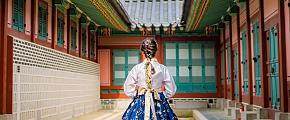South Korean Currency (KRW) Guide: Exchange Rates, Usage & Tips
This guide provides key information on currency in South Korea, including currency exchange rates, where to exchange, payment methods, and practical tips for using money effectively during your trip in South Korea.
What Is the Currency in South Korea
The official currency in South Korea is the South Korean won (Code: KRW), often symbolized as ₩.
The South Korean won comes in both coins and banknotes. Coins are available in 1, 5, 10, 50, 100, and 500 won denominations, while banknotes come in 1,000, 5,000, 10,000, and 50,000 won denominations.
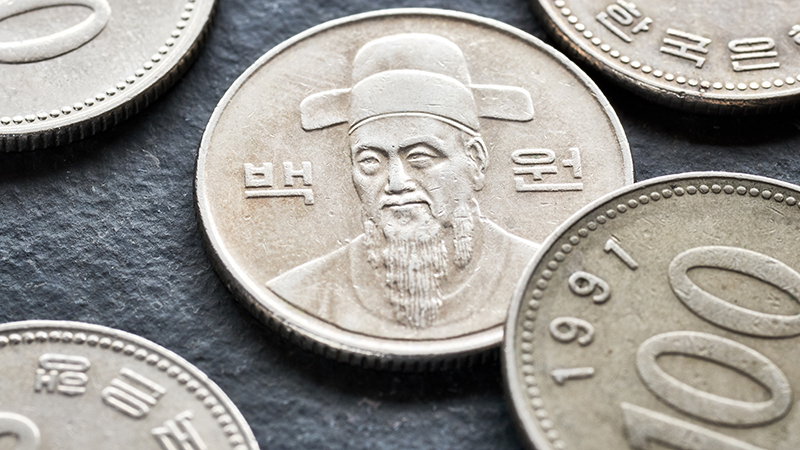 Coins in South Korea
Coins in South Korea
Is It 10,000 Won a Lot in South Korea
With 10,000 South Korean won, you can enjoy a budget meal at a local eatery, such as kimbap (Korean sushi roll) or bibimbap (mixed rice bowl), or buy some street foods like tteobokki (spicy rice cakes) together with hotteok (sweet pancake). Alternatively, you can get a coffee and a pastry at a café.
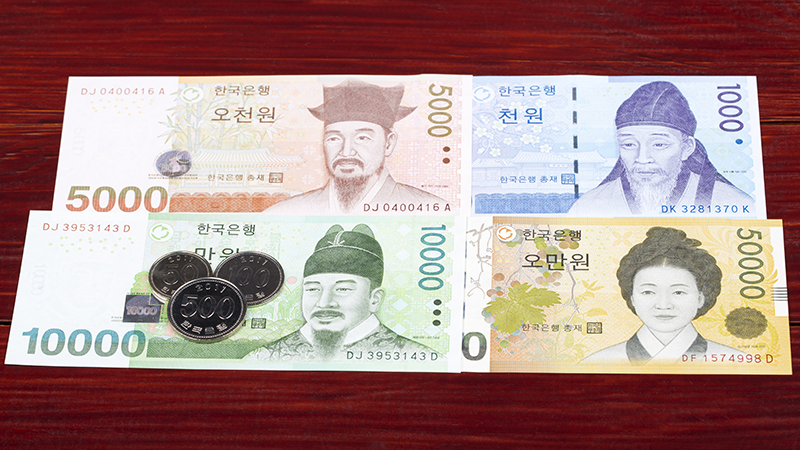 Notes of South Korea
Notes of South Korea
Quick View of Currency Rates
The exchange rate for South Korean won to foreign currency fluctuates. Take the currency rate of US dollars as an example, in the first half of the year 2025, it ranged from KRW 1,360.06 per USD to KRW 1,486.13 per USD. It is advisable to check the current rate before your trip.
As of the latest data at the time of writing this article (June 2025), 1 US dollar can be exchanged for 1,360.56 South Korean won. Check the table below for a reference:
| Foreign Currency Value | South Korean Won Value (June 2025 Updated) |
| 1 US Dollar | 1360.56 Won |
| 1 Euro | 1552.93 Won |
| 1 British Pound Sterling | 1884.94 Won |
| 1 Australian Dollar | 884.67 Won |
| 1 Chinese Yuan | 189.38 Won |
| 1 Japanese Yen | 9.49 Won |
Should I Exchange the Won Before Traveling
It is advisable to exchange a small amount of South Korean won before traveling to cover expenses upon arrival, like transportation from the airport, food and some small items purchases. However, considering the better exchange rates by withdrawing cash form ATMs in South Korea or exchanging money at local banks, you might exchange the rest amount of your travel needs locally.
Best Currency to Use in South Korea
South Korea primarily uses the South Korean won (KRW), and it is the best currency to use for most transactions. While some larger hotels, international airports, and tourist areas might accept major foreign currencies like the US dollar or the euro, it is not common.
The Main Payment Methods in South Korea
In South Korea, credit and debit cards are the predominant payment methods, accepted almost everywhere from restaurants and shops to public transportation. Mobile apps are gaining popularity, especially in cities. Cash is still used for smaller transactions, particularly in local markets, street vendors, small businesses and rural areas.
Credit and Debit Cards
Visa and MasterCard are widely accepted in urban areas, hotels, restaurants, and shops, though foreign transaction fees can apply, typically ranging from 1% to 3% of the transaction amount. Amex is also acceptable in larger establishments, high-end hotels and major retailers, but it is less commonly used than Visa or MasterCard.
Cash
Cash is widely accepted in both urban and rural areas of South Korea. Many small businesses, street vendors, and local markets often prefer cash transactions, so carrying some cash is practical and common.
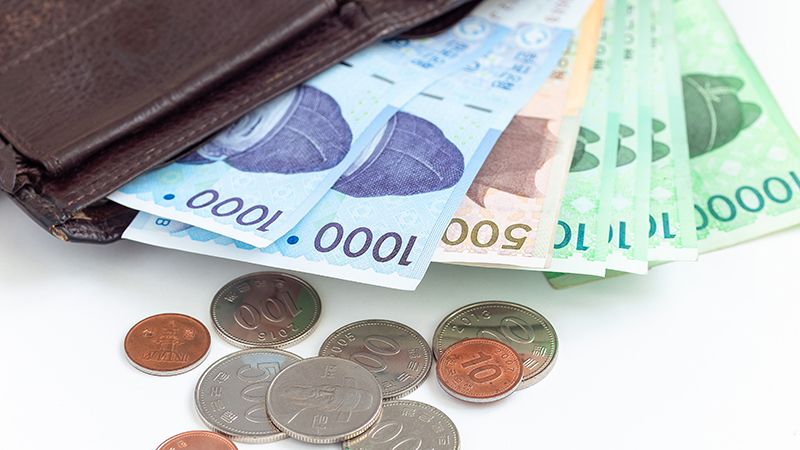 Use Cash in South Korea
Use Cash in South Korea
Mobile Payments
Apps like KakaoPay, Samsung Pay, and Naver Pay are locally popular, especially in urban areas, but they all require a Korean bank account to use.
Local Prepaid Cards
The T-Money Card is widely used for public transportation, including buses, subways, and taxis, and can also be used for small purchases at convenience stores.
The M-Pass Card is designed specially for travelers, offers unlimited rides on public transportation for a set number of days, making it ideal for short-term visits.
Prepaid Debit Cards can be used for general purchases like a regular debit card. These cards can be found at banks and convenience stores and are useful for managing expenses without carrying large amounts of cash.
Change Currency in South Korea
Currency exchange services are available in South Korea at various locations, including airports, major banks, and authorized currency exchange booths in popular tourist areas.
ATMs
that accept international cards are also widely available at convenience stores, subway stations, and banks. Below is the list of where and how to change money in South Korea, along with some helpful tips:
Airports
You can find currency exchange counters in arrival and departure halls in airports like Incheon International Airport, Gimpo International Airport, and other major airports. Exchange rates in airports might be slightly higher than in the city, but it is convenient for initial cash needs upon arrival.
Banks
Major banks like KEB Hana Bank, Woori Bank, Shinhan Bank, and KB Kookmin Bank have branches throughout cities. You can visit a branch with your passport, fill out a currency exchange form, and exchange your money.
Operating hours are generally from 9:00 AM to 4:00 PM, Monday to Friday. Banks offer competitive exchange rates and are a reliable option, but they may charge a service fee on top of the exchange rate, typically range from 1% to 3% of the transaction amount.
ATMs
You can withdraw South Korean won from ATMs, other than airports, banks, you can easily find ATMs in major subway stations and convenience stores like 7-Eleven, CU, and GS25. The exchange rate given by ATMs is generally competitive, but it is a good idea to check the rate beforehand.
Currency Exchange Booths
You can exchange money in one of the many authorized currency-exchange booths in popular tourist areas such as Myeongdong, Dongdaemun, and Itaewon in Seoul. They often offer competitive rates and are open longer hours than banks, remember to compare rates at a few booths to get the best deal.
Hotels
Hotel exchange rates are usually less favorable compared to banks and exchange booths, but they are convenient. You can inquire at the front desk or concierge in major hotels of tourist areas.
Tips for Handling Money in South Korea
- Tipping in South Korea is not a common practice and can even be seen as impolite. Instead, excellent services are usually rewarded with a polite and respectful thank you.
- If you are bringing in more than USD10,000 (or its equivalent in other currencies), you must declare the amount to the customs authorities upon arrival.
- Exchange money at reputable locations to avoid scams and counterfeit bills.
- Be mindful of transaction fees associated with currency exchange and ATM withdrawals. Some ATMs may also charge a local fee. Using ATMs affiliated with your home bank can sometimes reduce fees.
- Some exchange services may require proof of the original exchange, so retain your exchange receipts, as you may need them to exchange leftover KRW back to your home currency when departing South Korea.
- Inform your home bank of your travel plans to avoid having your card blocked for suspicious activity. Ensure your card is enabled for international withdrawals.
- ATMs may have daily withdrawal limits, both from the ATM itself and set by your home bank. Plan accordingly.
Plan Your South Korea Trip With Odynovo
Have questions about South Korea's currency or need expert travel tips on planning your South Korea trip? Our team is here to help. Contact us at [email protected] and explore South Korea with our knowledgeable local guides.
Related Posts You May Like
What Our Clients Say
Explore the latest verified reviews of Odynovo's travel services on Tripadvisor, Google, Trustpilot, Product Review and more trusted platforms.

